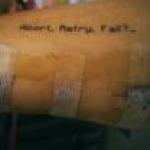Biobatteries. Anyone have knowledge or desire to make one?
Hi all!
Super happy to find this community.
I've been toying and doing rudimentary research (a lot of current info seems locked up in $$$$ science journals) about using a biobattery to make electricity directly from blood glucose and get around the whole power problem.
Does anyone have any experience or knowledge they'd like to share? Also would love expertise and discussion on making one. I'm no chemist but I am a machinist, and my shop is cool with letting me use their equipment on my off time. So I can help prototype things out if anyone needs that, I regularly hold tolerances at +/- .0005" (.012mm) and have done much tighter if needed.
Let's make a thing! I volunteer myself to be the guinea pig if we end up with something practicable.
--Helyx
Tagged:










Comments
and welcome to the world of science where everyone uses metric.
If you need access to certain papers people around here may be able to help you out, given you provide the name/id/whatever of the document in question.
About blood and devices getting in touch with it, that's a very dangerous thing. Devices in contact with blood have even harder requirements than regular implants. One tiny mistake and you'll clog up your blood vessels and die from a stroke. Try not to volunteer unless you are literally dead-sure it's going to work out fine.